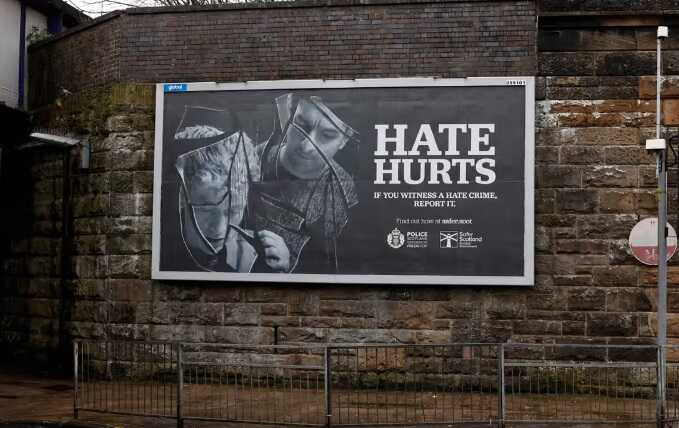Neo-Nazis flood police with complaints under recently enacted hate crime law in Scotland

First minister calls for end to vexatious reports after far-right agitators attempt to “overwhelm” official systems
Neo-Nazi and far-right agitators are exploiting Scotland’s new hate crime law to make vexatious complaints en masse in an attempt to “overwhelm” police systems.
A prominent figure in England’s white nationalist movement is among those urging followers to spam Police Scotland with anonymous online reports, the Observer has found.
The leader of a far-right group – one of several fringe organisations being assessed by the UK government under its new extremism definition – promoted a private channel on the encrypted messaging app Telegram that includes a “call to action” urging members to “mass report”.
Posts in the channel instruct members to log cases of supposed “anti-white” hate, which they say includes a statement on the police force’s website that “young men aged 18-30 are most likely to commit hate crime”.
“This public targeting of a group deeply offended us and thus we will report it as a racially motivated hate crime,” the channel administrator wrote.
Messages have also been posted directing the group’s 284 members to mass report tweets from members of the public, including one from a former local councillor who said that those most impacted by hate crime were “people of colour, disabled people, LGBT+ people, because it’s probably happened to them”. The administrator of the “hate crime reporting” group said the message was “offensive” and “singled out white men as evil”.
“At the very least, we want to overwhelm them with reports to waste their time [so that] they eventually give up the whole system,” they wrote, adding that people could report without using their name and even if they didn’t live in Scotland.
The efforts by far-right actors to overwhelm Police Scotland comes after a week in which the country’s new hate crime legislation faced fierce criticism. The law, which came into force on 1 April, says a person commits a criminal offence if they communicate material or behave in a way that a “reasonable person would consider to be threatening or abusive”, with the intention of stirring up hatred, based on a list of protected characteristics.
These include someone’s age, disability, religion, sexual orientation, transgender identity and variations in sex characteristics. It also includes a crime of stirring up hate based on race, colour or nationality, which was already illegal but is now part of the new act.
The Scottish government says the law gives more protection to victims while protecting free speech. But it has faced controversy for omitting sex from the list of protected characteristics it covers. Ministers say this is because a standalone bill tackling misogyny is in the works.
Critics also claim the law will stifle free speech, with high-profile figures including JK Rowling, Joe Rogan and Elon Musk among those to have publicly attacked it. After Holyrood minister Siobhian Brown said people “could be investigated” for misgendering someone online, Rowling dared police to arrest her over tweets she posted describing transgender women as men. Police Scotland said the tweets were not criminal. Yesterday, Rowling posted a 700-word statement on X outlining her views on gender issues and her concerns that women’s rights are being “dismantled”.
This weekend, Scotland’s first minister, Humza Yousaf, the leader of the SNP, defended the legislation, telling the PA news agency that “deliberate misinformation” was being “peddled by some bad actors” falsely claiming that it was now a criminal offence to make “derogatory comments” based on the characteristics covered in the act.
A government spokesperson added that the law had a “high threshold for criminality” and would not “prevent people expressing controversial, challenging or offensive views”.
Yousaf also warned people against making vexatious complaints. While official figures have not yet been released, Police Scotland reportedly received nearly 4,000 reports in the new law’s first three days. Many are understood to have been lodged against Yousaf himself over comments he made four years ago about a lack of non-white people in top jobs in Scotland.
The first minister said he was not surprised by the deluge and that “when legislation is first introduced there can sometimes be a flurry of vexatious complaints”. But he said he was “very, very concerned” about how many were being made, adding that “people should desist because they are wasting valuable police resources and time”.
Police Scotland said it had seen a “substantial increase” in reporting since the law came into effect but that this had not affected frontline policing. It is understood to have drafted in extra staff, paying them overtime to cope with demand.
Imran Ahmed, from the Center for Countering Digital Hate, said it was “extremely ironic” that the law was being “weaponised” by the same racist and misogynistic “bad actors” that had prompted its creation. He said the flurry of complaints from far-right activists was proof that the law had “failed to hit the right target” and that the Scottish government had “sought to prosecute speech” rather than social media platforms.
“The problem is the proliferation of hate speech on social media and the ways in which these platforms profit from, and give superpowers to, every hate group out there,” he said.
Before the law came into effect, the Association of Scottish Police Superintendents (ASPS) warned of its impact on police resources. Ch Supt Rob Hay, president of the ASPS, said in a letter to Holyrood’s justice committee that he was concerned the law would be “weaponised” by an “activist fringe” across the political spectrum which could divert police resources from more serious crimes.
Read more similar news:
Comments:
comments powered by Disqus






























